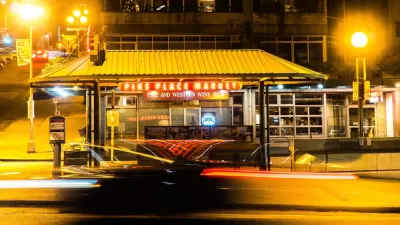It's a pattern seen as recently as two years ago in metro Atlanta: a crucial transit measure wins in the central city but dies in the more populous suburbs. The fix is to craft a city-only transit initiative—just what advocates in Seattle will do.
In opposite corners of the nation, the Southeast and Northwest, more numerous suburbanites out-voted central city residents in crucial transportation funding initiatives. Their defeats may be as much a reflection on the city-suburb split as it is a statement on transportation funding.
In the Atlanta region two years ago, a one per cent sales tax measure for transportation was defeated on July 31, 2012 and in King County, Washington a one-tenth of one percent sales tax and $60 motor vehicle registration fee to fund bus operations and road maintenance was defeated last Tuesday (April 22).
"Even though the plan known as T-SPLOST lost in all 10 Metro Atlanta counties and most regions statewide, most Atlanta voters cast ballots for the proposal. Inside city limits, T-SPLOST won by 16% of the vote," wrote Charles Edwards, the news director for NPR-affiliate, WABE in a post-mortem on the measure on August 7, 2012. [Listen here].
In Seattle, Proposition 1 supporters "are blaming suburbanites for rejecting the county measure. They said inside the city, voters are willing to spend on buses," writes the editor of Seattle's NPR affiliate, KUOW. The solution: "A new Seattle-only initiative will try to save buses inside city limits. A group called Friends of Transit said it filed the initiative with the Seattle City Clerk's Office Friday (April 25)."
As we noted Thursday, the new initiative will be a six-year property tax. Unlike county-wide Proposition 1 which directed 40% of the tax and vehicle registration fee revenues to road repair and maintenance, the new initiative will presumably use 100% of the property tax revenue for purchasing bus routes that operate at least 80% within city limits.
"Friends of Transit said that money would be used to buy back endangered routes from King County Metro. The idea of cities buying routes from Metro isn't new. King County Executive Dow Constantine says several cities in the region are doing it now.
Now the hard part. Once "the initiative is approved by the city clerk, supporters will need to gather more than 20,000 signatures to put it on the November ballot."
FULL STORY: New Bus Initiative Filed For Seattle Only, Prop 1 Continues To Fail

Planetizen Federal Action Tracker
A weekly monitor of how Trump’s orders and actions are impacting planners and planning in America.

Restaurant Patios Were a Pandemic Win — Why Were They so Hard to Keep?
Social distancing requirements and changes in travel patterns prompted cities to pilot new uses for street and sidewalk space. Then it got complicated.

Map: Where Senate Republicans Want to Sell Your Public Lands
For public land advocates, the Senate Republicans’ proposal to sell millions of acres of public land in the West is “the biggest fight of their careers.”

Maui's Vacation Rental Debate Turns Ugly
Verbal attacks, misinformation campaigns and fistfights plague a high-stakes debate to convert thousands of vacation rentals into long-term housing.

San Francisco Suspends Traffic Calming Amidst Record Deaths
Citing “a challenging fiscal landscape,” the city will cease the program on the heels of 42 traffic deaths, including 24 pedestrians.

California Homeless Arrests, Citations Spike After Ruling
An investigation reveals that anti-homeless actions increased up to 500% after Grants Pass v. Johnson — even in cities claiming no policy change.
Urban Design for Planners 1: Software Tools
This six-course series explores essential urban design concepts using open source software and equips planners with the tools they need to participate fully in the urban design process.
Planning for Universal Design
Learn the tools for implementing Universal Design in planning regulations.
Heyer Gruel & Associates PA
JM Goldson LLC
Custer County Colorado
City of Camden Redevelopment Agency
City of Astoria
Transportation Research & Education Center (TREC) at Portland State University
Camden Redevelopment Agency
City of Claremont
Municipality of Princeton (NJ)



























